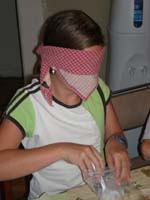from Erica K. Jacobsen, JCE High School Editor
The unofficial Marine Corps motto that is the title of this column was brought into popular culture by the gravelly voice of Clint Eastwood in the 1980s film “Heartbreak Ridge”. I don’t claim to have anywhere near the constitution or character of a Marine, but the motto has freshly come to mind as I’ve embarked on organizing an American Chemical Society (ACS) ChemClub for my local homeschool cooperative.
The motto does not relate to my time working with our interesting mix of students. Rather, the improvising, adapting, and overcoming happens before they even gather for our monthly meeting. Lack of a lab environment and its typical supplies requires improvising when planning for meetings. Club activities are performed in a kitchen, at a dining room table, or backyard when the weather’s nice. It’s taken some effort to gather and adapt activities that are exciting, educational, yet entirely doable by a group in the home. Oh, yes, and did I mention we’re also on a tight budget?
Turning to the Journal is a good first step. JCE Classroom Activities tend to fit the bill. The majority use chemicals commonly found in the home. Kitchen equipment can often be substituted for beakers and graduated cylinders. Many Activities fit easily into an hour-long meeting and lend themselves to a real world discussion. For example, the original November 2006 Activity and extensions from the January 2008 Classroom Activity Connections use nothing more than an assortment of full soda cans, water, and a deep container. Yet they can lead to discussions about controlling variables, a manufacturer’s choice of sweeteners, along with density and how it can be changed. The photo below shows a ChemClub member using JCE Classroom Activity #28: “More Than Meets the Eye”.
The JCE section “Chemistry for Everyone” yields useful material as well. In the January 2008 issue, Walker et al. describe simple experiments contained within Michael Faraday’s lecture series from 1860 that we can easily use today. Our Club (myself included) enjoyed performing many of these, using only candles, matches, and index cards.
Not familiar with ACS ChemClubs yet? Visit the ACS Web site and click on Education, then High School, then High School Chemistry Clubs. You can find out about the featured ChemClub of the Month, search for Clubs near you, and contact ChemClub organizers for more information. This exciting offering was piloted during the 2005–2006 school year, and was recently funded as a full program. The ACS ChemClub Office sends out quarterly packets to Club advisors that include multiple resources for a particular theme, including items from JCE and ChemMatters. The ACS Web site may be unfamiliar to your eyes at first. After extensive research into improving the organization of the site, ACS launched its new site at the end of September 2007. Boyd and Bruce describe the research process and the resulting site.
and click on Education, then High School, then High School Chemistry Clubs. You can find out about the featured ChemClub of the Month, search for Clubs near you, and contact ChemClub organizers for more information. This exciting offering was piloted during the 2005–2006 school year, and was recently funded as a full program. The ACS ChemClub Office sends out quarterly packets to Club advisors that include multiple resources for a particular theme, including items from JCE and ChemMatters. The ACS Web site may be unfamiliar to your eyes at first. After extensive research into improving the organization of the site, ACS launched its new site at the end of September 2007. Boyd and Bruce describe the research process and the resulting site.
JCE at NSTA Boston, Spring 2008
Stop by and visit with JCE staff and friends at the NSTA conference, held in Boston, MA on March 27–30, 2008. We’ll be at our exhibit booth as usual, but this year you can also find us sharing JCE resources during three conference presentations:
- Bringing Chemistry Home by Julie Cunningham, Thursday, March 27, 2–3 p.m.
- Publishing your Chemical Education Ideas: What, How, When, Where, Why? by Erica Jacobsen, Friday, March 28, 11 a.m.–noon.
- A Tasty Lesson: Using the Senses of Taste and Smell to Teach the Basics of the Cell by Lynn Diener and Robert Payo, Saturday, March 29, 11 a.m.–noon.
NSTA 2009 will be in New Orleans. If you’ve published an idea in JCE and plan to attend, why not present your work? The proposal deadline is April 15, 2008; information is available online. The JCE Outreach and High School Offices will provide copies of your article to hand out to participants, as well as other freebies such as JCE pencils, JCE issues, temporary passwords to JCE Online, etc. For information, contact me (jacobsen@chem.wisc.edu).
Laura’s Take on the Issue
from Laura Slocum, JCE High School Associate Editor
The end of one year and the start of the next is often a time when many look back, ahead, or perhaps both simultaneously. During my own reflection, I was once again reminded about the impact we have not only on our students, but also on each other. It has been 32 years since I took my first high school chemistry course. However, those two high school chemistry teachers and later several college chemistry professors instilled in me a passion for chemistry that continually grows. Herron’s article, “Advice to My Intellectual Grandchildren”, especially reminded me of the people who have laid the chemical education foundation we use today. Many of us do not actually know these people, but we are likely their third, fourth, or even fifth generation. I am grateful that chemical educators at all levels continually reach out in various ways to encourage fellow and future chemical educators. Many of them, like us, will never fully know the impact we have on the lives and future careers of others.



* You can follow any responses to this entry through the RSS 2.0 feed.